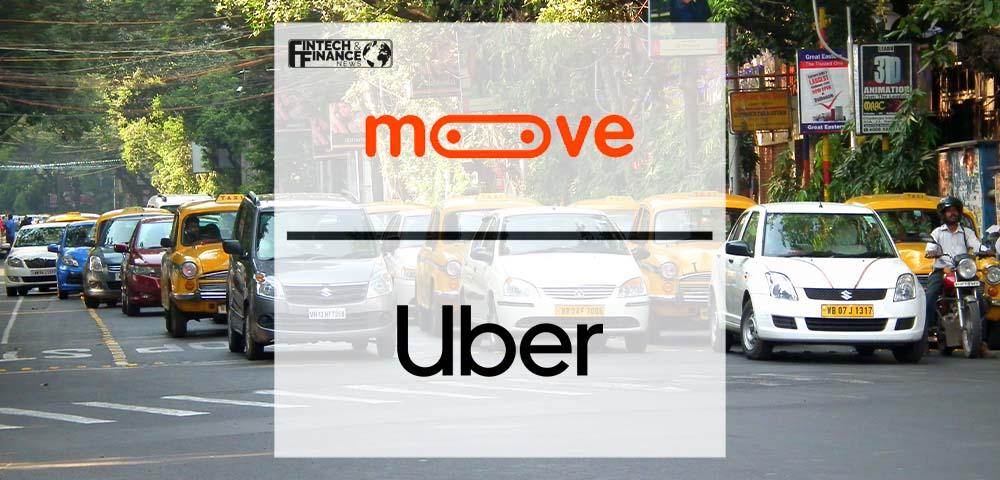Moove is an African FinTech company that provides financial services to mobility entrepreneurs. In simple words, if you want to start a taxi business with Uber, Moove will provide you with the finances required to acquire a car. You repay the amount through a monthly payment plan. Now, you might say that a bank will provide you with the same service, right? Well, Moove has a different and more friendly approach. We speak to Ladi Delano, the co-founder and co-CEO of Moove and find out more about him and how Moove operates.

Can you tell us about yourself and what industries have you worked with?
Growing up in London, I have been an entrepreneur for most of my life.
I didn’t have a linear path into business and have built companies across a number of industries across Europe, Asia and Africa. Following the successful exit of my last business, I decided to return to my studies and earned an MPA at London School of Economics and an MSc in Management from the University of Oxford, although this all took place 10 years later than initially expected!
I met Moove’s Co-CEO, Jide Odunsi during our undergraduate time in London. We were both inspired to combine entrepreneurialism with creating economic value as an avenue to solving societal issues, when we both fell upon an academic paper titled ‘Creating Shared Value’ by Michael Porter. This led us to found Grace Lake Partners (GLP), a venture studio based in Nigeria. Over the next 6 years, we launched three successful shared value businesses which are still operating today although we no longer manage the day-to-day operations
What led to the inception of Moove?
My co-founder Jide Odunsi and I knew from personal experience that accessing credit and banking finance is very difficult for a vast proportion of African society. Payday loan platforms and alternative avenues of credit sprouted in Nigeria but these were extremely expensive options that led many into a downward spiral of eternal debt.
Together we set out to find a solution that we could scale beyond Nigeria to other markets and it led us to Vehicle finance. Today’s gig workers lack access to credit because traditional banks rely on historical data to underwrite their loans. Asset ownership in Africa, and increasingly across the globe as we see the rapid development of the gig economy, remains a key component on the path to financial security.
Moove was founded in 2019 and focuses on unlocking access to credit for millions of mobility entrepreneurs and is the world’s first mobility fintech.
The business is centred around the core concept of Creating Shared Value and strives to deliver on three key impact objectives: 1) 100% financial inclusion; 2) 60% electrification of vehicle fleet; and 3) 50% female drivers. In 2022, we have now expanded globally where we have established strategic partnerships across the mobility ecosystem, including global ride-hailing, instant delivery, trucking & logistics platforms, vehicle OEMs, and other service providers. We now operate across 13 cities within SSA, MENA and EMEA with 5 vehicle classes, Cars, Trucks, Bikes, Vans and Buses.
Can you elaborate on how the Moove platform works?
Moove embeds its alternative credit-scoring technology onto ride-hailing and e-logistics platforms, which allows us to access and use proprietary performance and revenue analytics of mobility entrepreneurs to underwrite loans. Our model is to provide loans to our customers by selling them new vehicles and financing up to 95% of the purchase within five days of sign up. Moove customers can choose to pay back their loans over 24 to 60 months, depending on the vehicle, using a percentage of their weekly revenue. All Moove customers sign up to the Moove app to manage all transactions and access other financial products on the platform.
Do the drivers need to meet a certain pre-requisite before they are approved for financing?
At Moove, we want to make the driver evaluation process simple. To do this, we ask each potential driver to apply to our website at moove.io. We then verify the drivers details and if all requirements are met, they could be driving their own new car in just five days.
Our process is very clear and transparent for our customers. We don’t underwrite customer financing based on historical financial transaction information as does traditional underwriting. Moove’s alternative credit scoring technology utilises proprietary performance and revenue analytics. This allows our customers to access asset ownership and sustainable employment by collateralising their future productivity and earning potential as mobility entrepreneurs
Have you faced any challenges in setting up shop here? If yes, how have you dealt with them?
As part of Moove’s global expansion, we successfully launched in Mumbai and Hyderabad a month ago however it has not been without its challenges. The region is a rich and diverse economy with multiple demographics throughout. To efficiently develop our business model, we focused on a localised approach to meet the specific needs of each market. In every new market, we work very closely with our partners to ensure the needs of the local customers are met.
Our customers, the mobility entrepreneurs of India SA, like many entrepreneurs around the world, have suffered a lot during these last 2 years from the global effects of COVID-19. Many lost their vehicles and their trust in this sector. As an impact-led business, Moove is committed to democratising vehicle ownership by breaking down the barriers of access to finance and thereby creating sustainable job opportunities. The accessibility of our products, transparency with our customers, and our focus on customer success has led Moove to building a business centred around their growth and their aspirations.
What steps are you taking towards the electrification of the fleet?
Moove launched in India as Uber India’s largest fleet partner targeting 5000 3-wheel and 4-wheel vehicles. We have initially launched 4 wheel CNG (compressed natural Gas) vehicles with UberGo and are targeting 2000 Electric vehicles. We expect to have a captive fleet of 30k vehicles in India over the next 2-3 years contributing significantly to Ubers supply requirements. We are constantly analysing the market for the introduction of a fit-for-purpose cost effective ride hailing EV 4Ws in India. Given the charging related challenges we are also exploring partnerships to help service these EVs and embed ourselves within the EV charging value chain to launch an EV product that meets the needs of our customers.
Your vision is to have 50% women customers, what is the current ratio and what steps are you taking to accelerate the growth of women customers?
Our very first market, Nigeria, has a gender gap in financial inclusion of 24%, the highest across all of Sub-Saharan Africa. This is when we realised that a lack of access to transport impacts women’s employment potential, reducing their participation in the labour force by 15%. Our commitment to our impact goals of 50% female financing and 100% financial inclusion recognises that by increasing women’s access to financial services, they in in turn, have greater access to assets which engenders greater financial independence and control over their lives.
Developed in partnership with our women customers, Moove developed a Women’s Ambassador Program to facilitate a collaborative support network and mentorship for our female customers. This collaborative initiative enables constant communication about the needs of our female customers and ensures their needs are considered in the development of our products.
Moove has also launched a female-specific product, tailored with these specific needs of women in mind. In providing sustainable employment, we empower women to financial freedom. Launched in South Africa, this will be rolled out to other Moove markets in due course.
Apart from Mumbai, Hyderabad, and Bangalore, which cities are you focusing on in the coming months?
Delhi. We look forward to our further expansion across India, to bring our revenue-based financing model to more customers in the country.

